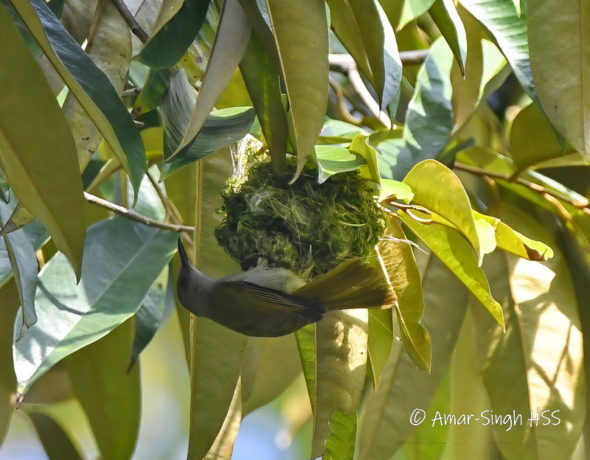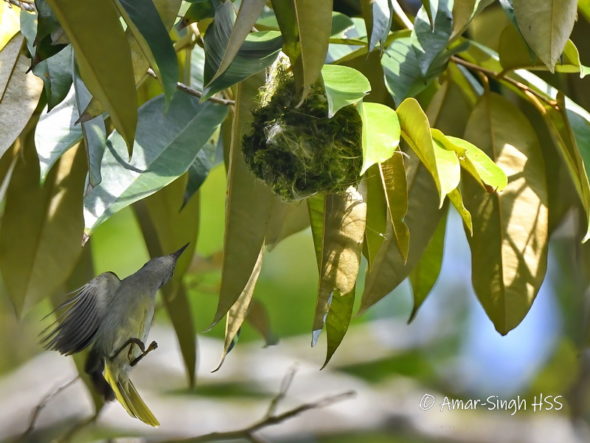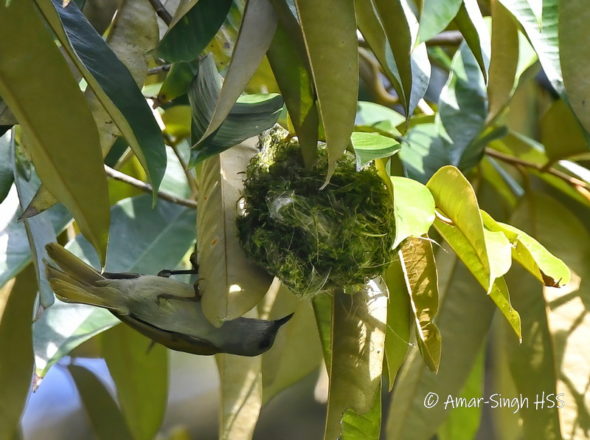A few of us observed a pair of Plain Sunbird Anthreptes simplex nesting today (19th May 2022) at the fringe of a forest reserve in Ipoh, Perak. There are limited reports of nesting of this species and this is a preliminary report on this nesting episode.
Nest Location
The nest was located approximately 11-12 meters, high up in a tree (species unknown, although the leaves did look like that of the Durio species). A prior nesting report (Wells 2007) described a nest suspended 3.5 meters up an Acacia mangium tree. This nest was hidden under a thin branch, sheltered by the leaves, on the outer part of the foliage.
Nest structure
The nest is globular and appeared to be made of grass and fibre; it was still green. It is possible that some moss is used. The nest has been described in the past (Cheke & Mann 2001) as untidy, with material sticking out in all directions. But this nest appears quite neat. As previously noted, there is no eave or ‘porch’.
Nesting Observations
The height made observations difficult. I used my Nikon P900 to get closer videos and longer observations. I have edited a lot of footage to give a few nest visits, so as to provide an idea of the behaviour of the birds. Note that the video shown here is at normal speed.
- Both the adult male and female visited the nest.
- No nesting material was brought by either partner, suggesting that nest building is completed.
- As the nest opening is on the side and not in view, we were not able to determine if there were any chicks.
- However we are not able to understand the behaviour of the birds. Most of the visits are extremely brief. Many were fluttering episodes that did not reach the nest (only a tiny fraction of these are shown on this video). Some appeared to be nest ‘observations’, where the bird looks at the nest. Some nest visits may have been feeding episodes but none of us saw any food in the beaks.
- This behaviour was occurring even at the start of our observation and the birds were not disturbed by observers (we were situated too far below). The behaviour went on intermittently for 2 hours of our observation.
- If you look at the video, at the end, I have included a segment to show that there are Oecophylla smaragdinaants (Weaver Ant, Tailor Ant, Kerengga) at the nest. I do not think this is a problem as I have observed Brown-throated Sunbirds Anthreptes malacensispreferentially nesting in trees with these ants (Amar 2016).
Could the birds have been feeding nectar that we could not see?
Perhaps Plain Sunbirds do not nest near Kerengga ants and the parents were showing distress behaviour due to the ants’ presence (? attacking juveniles).
We hope further observation will make this unusual behaviour clearer.



References:
- Wells, D.R. (2007). The birds of the Thai-Malay Peninsula: Vol. 2 (Passarines). Christopher Helm, London.
- Robert A Cheke, Clive F Mann, Richard Allen (2001). Sunbirds: A Guide to the Sunbirds, Flowerpeckers, Spiderhunters and Sugarbirds of the World. Helm Identification Guides.
- Amar-Singh HSS (2016). Brown-throated Sunbird – nesting. Bird Ecology Study Group.
https://besgroup.org/2016/06/28/brown-throated-sunbird-nesting/
Dato’ Dr Amar-Singh HSS
Ipoh, Perak, Malaysia
David Wells Responded on 20th May 2022:
>C.J. Hopwood’s description of his Myanmar nest says that it did have an eave,
>but identification of the nest occupant (shot) may not have been correct.
>Also, from its low position I wonder if what appears to be a hole is actually a true nest entrance?
>Perhaps an interlude in building, or it might have been disturbed?
Amar replied to David Wells on 20th May 2022:
Dear David,
Thank you for the kind and quick response.
I had read your write up on Hopwood’s description.
- As the nest material is still green, this must be a fresh nest – in construction or just finished
- We were alerted to the nest’s presence by the fluttering behaviour of the adults.
- It could be that the Oecophylla smaragdinaants have attacked or threatened the juveniles in the nest and hence the parents are agitated.
One colleague’s video showed one episode where it is possible an adult is picking off an ant.
- I did not understand your comment about “from its low position”?
As I mentioned the nest is very, very high up 11-12 meters (~40 feet).
The Nikon P900 (and 1000) cameras are superb as to their optical reach.
Amar gave an update on these nesting Plain Sunbird Anthreptes simplex on 22nd May 2022:
A visit on 20th May 2022 by Poon Kuan Yaow and Cheaw Hon Ming who originally saw the nest with me showed that there was no more adult activity.
Another visit on 21st May 2022 by Chiu Sein Chiong also reported no nest activity.
Either the chicks have fledged, which is unlikely given the green nature of the nest,or more likely the nest has been abandoned due to the red ants.








